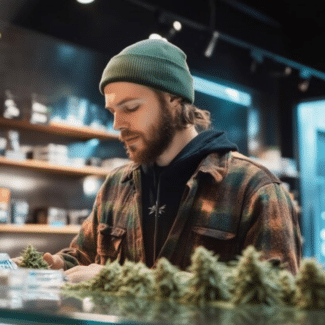Budding Brilliance: Harnessing the Power of Diversity for Canna-Innovation
This article explores the critical importance of fostering diversity within the cannabis industry. It highlights both the moral and business imperatives of building a diverse workforce and offers insights into the current state of diversity in cannabis. The piece emphasizes that achieving diversity is a long-term commitment requiring intentional strategies, measurement of progress, and a shift in corporate culture to ensure inclusivity at all levels.

What does it mean to have a diverse workforce, and why is it something that canna-businesses need? There’s a moral argument and a business argument to be made for intentionally creating a diverse staff in your cannabis company. But harnessing the power of diversity is not a quick fix or a magic pill — it’s a long-term strategy to success that requires tracking, measurement, and getting rid of leadership ego.
What Does Diversity Look Like in the Cannabis Industry?
Calling for more cannabis diversity in the workplace can feel confusing — what does diversity look like in a company?
Merriam-Webster defines diversity as “the condition of having or being composed of differing elements.” Applied to a workforce, this looks like employing people of different genders, races, ages, sexual orientations, and physical/ mental abilities. In the cannabis industry, we’d be remiss not to include “conviction status” as well — the work and sacrifice of the people in the legacy market (as well as the price they paid) was crucial for getting cannabis to where it is today.
A diverse workforce is not homogenous. Click on the “About” section of most major companies and you’re likely to see a homogenous C-Suite, composed heavily of white men. While many companies focus on diversity at entry-level positions, effective diversity programs increase the diversity of an organization from the top down, creating a workforce as varied as the makeup of pedestrians on any given sidewalk in New York City.
Intentionally creating a diverse workforce is not a problem limited to the cannabis industry; it’s one that every industry is grappling with. Diversity is not about “giving” positions to people because of their identities — rather, it’s about intentionally looking outside of your typical circle for qualified people who may have otherwise been overlooked.
The executive leadership team at Leafly is a great example of what diversity in action looks like as are the following companies:
- Simply Pure. CEO Wanda James leads the first Black-owned dispensary/ cultivation facility/ edibles company in the country. James is also the Board Chair of the Last Prisoner Project, a non-profit dedicated to freeing people convicted on cannabis charges. She is a prominent voice for social justice, cannabis reform, and record expungement.
- 40Tons Brand. Loriel Alegrete is the owner and CEO of 40 Tons Brand, a fashion brand that uses clothes as advocacy for people incarcerated on cannabis charges. Alegrete began 40 Tons when her husband and his business partner were sentenced to federal prison on overblown cannabis charges. Alegrete champions the brand and uses her position to mentor and advocate for Black women in the cannabis industry.
- Tetragram. Otha Smith is the founder and CEO of Tetragram, an app that helps cannabis consumers discover their optimal experiences through journaling and crowd-sourcing product reviews. Smith turned to cannabis after a devastating car accident and he was tapped as a 40 Under 40 Rising Stars by Marijuana Venture Magazine in 2021 after the first launch of Tetragram.
The Current State of Diversity in Cannabis
As an emerging field, cannabis is uniquely positioned to lead the way in diversity — but has it?
MJBiz Daily tracks diversity in the cannabis industry annually. Back in 2019, the cannabis industry was heralded as a diverse hub and MJBiz reported that 36% of executives were women and 20% were from minority communities — far above the average for other industries.
But post-pandemic, the cannabis industry was actually worse than most, and by 2021, a mere 22% of executives were women and a paltry 13% were from minority communities. There were many reasons and factors for this, but the end result was the same — cannabis executives were overwhelmingly white and male.
Today, this number is on the rise again. MJBiz reported in 2023 that 39% of cannabis executives were women and 24% came from minority communities. Intention is a key part of building a diverse workplace, and when companies focus on hiring talent over gender or race, their companies do better.
The Business Case for Diversity in Cannabis
Diversity matters because diverse businesses are more creative, adaptable, and profitable. And every business in cannabis needs to be creative, adaptable, and profitable.
Diverse work environments are representational of the world at large, and diversity can foster a strong sense of belonging. If you don’t think feeling like you belong at work matters, consider this: a Deloitte report from 2018 found that “organizations that [have] inclusive culture are twice as likely to meet or exceed financial targets, three times as likely to be high-performing, six times as likely to be innovative and agile, and eight times more likely to achieve better business outcomes.”
How do you foster an inclusive culture? Through intentional diversity programs: creating and documenting a process to attract more candidates from traditionally underrepresented backgrounds.
One of the reasons diverse organizations are more creative is because of an abundance of perspectives. Diversity of people also brings diversity of mindset, what Deloitte has termed “cognitive diversity”. When you have cognitive diversity on your team, people see the world and solve problems differently — which means someone always has a fresh idea on how to approach things. Creativity is a big differentiator in a crowded market.
Barriers to Diversity in the Cannabis Industry
Intention and process are a great place to start — but what next? Breaking down barriers begins with identifying them, so what’s keeping people out of the workforce?
There are both legal and societal barriers to entering cannabis, and the roots of these problems date back decades. They include the legacy of the war on drugs and how certain communities, such as the Black and Latino communities, were disproportionately targeted by law enforcement, and the ripple effect that is still felt today. Hurdles also include exclusion from networking events, lack of awareness around potential positions, and a history of disenfranchisement.
AlphaRoot broker Griffin Basden said it best when she told Syracuse.com “I don’t believe there is one single significant barrier but instead a confluence of barriers creating a wall, per se. And I don’t think these roadblocks for traditional industries differ much from cannabis — except that cannabis is “emerging,” and newer markets rarely have loads of access to more sophisticated awareness about diversity and inclusion.”
To overcome these challenges, your business needs to think outside the box. Consider the following questions:
- If you have a job opening, you may post it on Indeed or LinkedIn, but have you considered attending a job fair to recruit?
- Do you require a degree that really isn’t necessary for success?
- Is your business able to assist with tuition costs to help your staff further their education and advance internally?
- Can you provide flexible hours for working mothers and caregivers?
- Are you excluding people with felony convictions from even applying?
Canna-businesses can also champion diversity by supporting legislative policy reform for expungements for people with cannabis convictions and ensuring that cannabis legalization in your state doesn’t leave people from the legacy market behind. Entrepreneurs can join networking groups to mentor women and minorities in starting a business. And every cannabis business should host diversity, inclusion, and sensitivity training to create a supportive culture.
Building and Operating a Diverse Cannabis Business
Diversity requires an inclusive culture — and that may require a long, hard look at your own organization. If you can’t identify gaps keeping women and minorities from working at your company, that’s the first issue to be addressed.
An inclusive culture starts from the top and trickles down. If you have executives making jokes about getting back into the kitchen and felony convictions, your employees will understand that to be acceptable behavior. If your managers work overtime every day and skip their children’s events, your team will understand that to be the expectation. Diversity is not something you can pay lip service to and expect to succeed — it takes true dedication.
“The guys in control hire their buddies to work for them.” Basden told Syracuse.com “It’s a nepotistic field, so it really comes down to the individuals in positions of power to demand to have underrepresented parties on their team.”
To change the diversity of your workforce, you have to change how you approach hiring and measuring people’s potential for success. You need to intentionally remove personal bias from the hiring process. This can mean something as simple as removing names and identifying information about candidates from resumes all the way up to hiring a DEI firm to evaluate your hiring process. If your company has an established culture that is not inclusive, it will take time and training to course-correct.
But this is business we’re talking about — and what you don’t track, you can’t monitor. Data collocation is a vital part of understanding the success of diversity programs. This requires transparency, not just from one company in cannabis, but all of them. Without the tracking from MJBiz Daily, we would never have known the impact the pandemic had on women and minority leaders in the cannabis space — or how it’s rebounding.
Supporting and Nurturing Diversity
Creating a diverse workforce takes intentional, regular action. A few ways your company can take action are:
- Create initiatives and programs to support diversity in the cannabis industry. Visit job fairs to recruit, eliminate unnecessary degree requirements for entry-level positions, and invest in continued staff education to promote from within.
- Community involvement. Don’t just be a store-front operation, be a part of your community. Join networking groups aimed at underrepresented communities, create partnerships with community support organizations, engage in mutual aid, and ensure your staff is treating every customer with equal respect.
- Highlight resources for diverse entrepreneurs and employees. One of the best ways businesses can promote diversity is by amplifying the voices of the hundreds of professionals already speaking out about it. There’s no need to reinvent the wheel when it comes to messaging — find someone in your community who is creating resources and promote those.
- Mentorship. A history of disenfranchisement within certain communities has a generational ripple effect, and this mean that many bright, motivated people who could make stellar entrepreneurs lack the means or the access to business acumen and learning. Providing business mentorship can make a big difference to fledging entrepreneurs and set them up for long-term success.
- Encouraging a culture of listening and learning within the organization. If you can’t create an environment where employees feel comfortable sharing problems and barriers to success, nothing will change. Setting your ego aside is a crucial part of effective leadership and fostering an inclusive culture. You don’t know what you don’t know, but you can’t react poorly when employees share what you don’t know.
A diverse workforce may not seem directly related to insurance, but it’s one more piece of the puzzle to success in the cannabis industry. Hiring diverse employees helps your business become more profitable and protecting your cannabis company helps it become more stable.
Protecting your cannabis company can seem confusing; however, we’re a full-service insurance brokerage working with carriers worldwide to offer you the best coverage possible. We’re here to help! Please reach out to us today by emailing info@alpharoot.com or calling 646-854-1093 for a customized letter of commitment or learning more about your cannabis insurance options.



